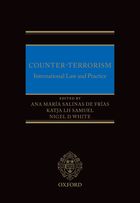On Wednesday 23 May 2012, the ICCT organised the book launch of "Counter-Terrorism: International Law and Practice" (Oxford University Press, 2012), by Prof. Dr. Ana María Salinas de Frías, Dr. Katja Samuel and Prof. Dr. Nigel White.
A word of welcome by ICCT Director Peter Knoope, Prof. Dr. Wouter Werner, of VU University, Amsterdam and Chair of the evening, introduced the speakers and congratulated them on the book, which can be seen as a comprehensive overview of counter-terrorism law.
Dr. Katja Samuel, UK Barrister, Associate Lecturer at the University of Nottingham, and co-editor of the book 'Counter-Terrorism: International Law and Practice’, then gave the opening presentation. Dr. Samuel gave an overview of the multinational, multidisciplinary collaborative research project under the umbrella of the World Justice Project that had led to the book’s publishing. In total, the process had taken over three years, with the book drawing upon the expertise of more than 40 multinational, multidisciplinary experts worldwide. She added that the book is both practical and solution-orientated, and that its findings and 180+ recommendations are aimed primarily at the governmental and intergovernmental audience. Furthermore, she highlighted the book’s structure, which takes the UN Global Counterterrorism Strategy as its analytical starting point, in particular those legal principles identified in Pillar IV: the UN Charter, international human rights, humanitarian, refugee, and criminal law. . In addition, she suggested that the international rule of law framework applicable to counter-terrorism was in fact much broader, incorporating other legal principles including, but not limited, to democratic principles; the principles of necessity and proportionality; equality and non-discrimination; access to justice, reparation and accountability; and legality. She made the point that because the international legal counter-terrorist framework, in particular the UN Global Counter-Terrorism Strategy, is still in its relative infancy, that now is a critical period in its normative development to ensure that all relevant principles are given equal attention, including their interrelationship, to ensure that a robust and durable framework exists. She finished by outlining some key areas of weakness and strain within the existing framework, including practices relating to the concept of prevention, normative and policy created gaps.
The next speaker, Prof. Dr. Nigel White, Professor of Public International Law at the University of Nottingham and one of the other co-editors of the book, challenged the existing view of the incompatibility of human rights and collective security in the implementation process of counter-terrorism measures. He explained that although tension between both concepts exists, a reconciliation of both human rights and collective security is important for the long-term credibility and legitimacy of counter-terrorism measures. The book, therefore, focuses on both regimes at the same time. Prof, Dr. White also underscored the importance of the prevention of terrorist acts and argued that the upholding of human right’s principles and adhering to the rule of law can help to make it easier to prevent terrorism.
Helen Duffy, International Lawyer at Human Rights in Practice, and contributor to the book spoke next. Duffy wanted to draw attention to the practical developments in terms of pursuing justice from criminal acts stemming from counter-terrorism measures, for instance in relation to extraordinary rendition and secret detention. She focused on the challenge to the rule of law that the dearth of criminal prosecutions and victim reparation represent, and on the legal and practical challenges that arise for victims of counter-terrorism measures in pursuing justice and access to a remedy.
In the second part of the evening, Dr. Marianne Hirsch Ballin, Attorney, Pels Rijcken & Droogleever Fortuijn, and ICCT fellow Dr. Bibi van Ginkel, LL.M. acted as referents and provided some useful comments on the book and the presentations. Dr. Hirsch Ballin emphasized the importance of identifying rule of law principles as core principles when drafting counter-terrorism measures, since there is no internationally agreed definition on terrorism and counter-terrorism frameworks in different countries vary. She stated that the upcoming challenge is to make the counter-terrorism system rule of law applicable, as these principles are the same everywhere, both on the national and international level. In this way, diversification in legal standards on counter-terrorism measures between different countries can be prevented. Dr. van Ginkel followed up on this point, and highlighted some important developments in the last ten years of counter-terrorism policies. She explained that we are shifting towards a more comprehensive approach (a focus on both hard core security responses and human rights) in counter-terrorism measures. In addition, she acknowledged Prof. White’s point about the prevention of terrorism and noted that authorities are now shifting their resources to the preparation phases of terrorism in order to disrupt terrorism at an early stage.
The evening concluded with an open floor Q&A session, with a useful exchange of ideas and comments, followed by a drinks reception.






